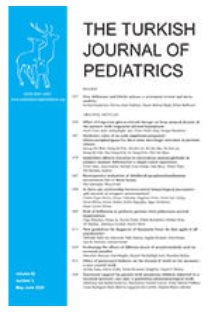Emotion regulation in adolescents with acne vulgaris: correlates of medication adherence, clinical dimensions and psychopathology symptoms: a cross-sectional study
___
1. Zaenglein AL, Pathy AL, Schlosser BJ, et al. Guidelines of care for the management of acne vulgaris. J Am Acad Dermatol 2016; 74: 945-973.e33.2. Wolkenstein P, Machovcová A, Szepietowski JC, Tennstedt D, Veraldi S, Delarue A. Acne prevalence and associations with lifestyle: a cross-sectional online survey of adolescents/young adults in 7 European countries. J Eur Acad Dermatol Venereol 2018; 32: 298-306.
3. Tasoula E, Gregoriou S, Chalikias J, et al. The impact of acne vulgaris on quality of life and psychic health in young adolescents in Greece. Results of a population survey. An Bras Dermatol 2012; 87: 862- 869.
4. Voelker D, Reel J, Greenleaf C. Weight status and body image perceptions in adolescents: current perspectives. Adolesc Health Med Ther 2015; 6: 149- 158.
5. Nguyen CM, Beroukhim K, Danesh MJ, Babikian A, Koo J, Leon A. The psychosocial impact of acne, vitiligo, and psoriasis: a review. Clin Cosmet Investig Dermatol 2016; 9: 383-392.
6. Yazici K, Baz K, Yazici AE, et al. Disease-specific quality of life is associated with anxiety and depression in patients with acne. J Eur Acad Dermatol Venereol 2004; 18: 435-439.
7. Hazarika N, Archana M. The psychosocial impact of acne vulgaris. Indian J Dermatol 2016; 61: 5155520.
8. Ayer J, Burrows N. Acne: more than skin deep. Postgrad Med J 2006; 82: 500-506.
9. Philipp J, Zeiler M, Waldherr K, et al. Prevalence of emotional and behavioral problems and subthreshold psychiatric disorders in Austrian adolescents and the need for prevention. Soc Psychiatry Psychiatr Epidemiol 2018; 53: 1325-1337.
10. Neumann A, van Lier PAC, Gratz KL, Koot HM. Multidimensional assessment of emotion regulation difficulties in adolescents using the Difficulties in Emotion Regulation Scale. Assessment 2010; 17: 138- 149.
11. Saritas D, Gençöz T. Psychometric properties of the Difficulties in Emotion Regulation Scale (DERS) in a Turkish adolescent sample. 12th European Congress of Psychology, Istanbul, 2011.
12. Goodman R. The strengths and difficulties questionnaire: a research note. J Child Psychol Psychiatry 1997; 38: 581-586.
13. Güvenir T, Özbek A, Baykara B, Arkar H, Şentürk B, İncekaş S. Güçler ve güçlükler anketinin (GGA) Türkçe uyarlamasının psikometrik özellikleri. Çocuk ve Gençlik Ruh Sağlığı Dergisi 2008; 15: 65- 74.
14. Morisky DE, Ang A, Krousel-Wood M, Ward HJ. Predictive validity of a medication adherence measure in an outpatient setting. J Clin Hypertens (Greenwich) 2008; 10: 348-354.
15. Oğuzülgen IK, Köktürk N, Işikdoğan Z. Astım ve kronik obstrüktif akciğer hastalarında Morisky 8-maddeli ilaca uyum anketinin (MMAS-8) Türkçe geçerliliğinin kanıtlanması çalışması.Tuberk Toraks 2014; 62: 101-107.
16. Doshi A, Zaheer A, Stiller MJ. A comparison of current acne grading systems and proposal of a novel system. Int J Dermatol 1997; 36: 416-418.
17. Vilar GN, Santos LA, Sobral Filho JF. Quality of life, self-esteem and psychosocial factors in adolescents with acne vulgaris. An Bras Dermatol 2015; 90: 622- 629.
18. Cisler JM, Olatunji BO, Feldner MT, Forsyth JP. Emotion regulation and the anxiety disorders: an integrative review. J Psychopathol Behav Assess 2010; 32: 68-82.
19. Pisetsky EM, Haynos AF, Lavender JM, Crow SJ, Peterson CB. Associations between emotion regulation difficulties, eating disorder symptoms, non-suicidal self-injury, and suicide attempts in a heterogeneous eating disorder sample. Compr Psychiatry 2017; 73: 143-150.
20. Tan JK. Psychosocial impact of acne vulgaris: evaluating the Evidence. Skin Therapy Lett 2004; 9: 1-3.
21. Gupta MA, Gupta AK. Depression and suicidal ideation in dermatology patients with acne, alopecia areata, atopic dermatitis and psoriasis. Br J Dermatol 1998; 139: 846-850.
22. Fried RG, Gupta MA, Gupta AK. Depression and skin disease. Dermatol Clin 2005; 23: 657-664.
23. Zouboulis CC, Böhm M. Neuroendocrine regulation of sebocytes - a pathogenetic link between stress and acne. Exp Dermatol 2004; 13(Suppl 4): 31-35.
24. Moradi Tuchayi S, Alexander TM, Nadkarni A, Feldman SR. Interventions to increase adherence to acne treatment. Patient Prefer Adherence 2016; 10: 2091-2096.
25. Renzi C, Picardi A, Abeni D, et al. Association of dissatisfaction with care and psychiatric morbidity with poor treatment compliance. Arch Dermatol 2002; 138: 337-342
- ISSN: 0041-4301
- Yayın Aralığı: Yılda 6 Sayı
- Başlangıç: 1958
- Yayıncı: Hacettepe Üniversitesi Çocuk Sağlığı Enstitüsü Müdürlüğü
Life-stage factors associated with overweight severity inadolescents
Raziye Dut, Antonio Videira-Silva, Ana Sofia Vilardouro, Silvia Freira, Helena Fonseca
Jale KARAKAYA, Meral HURİ, Hülya KAYIHAN, Elif N. ÖZMERT, Tuba ÇELEN YOLDAŞ
Ebru AZAPAĞASI, Tanıl KENDİRLİ, Serhan ÖZCAN, Gökçen Öz TUNCER, Halil ÖZDEMİR, Ömer Suat FİTÖZ, Erdal İNCE
Ahmed Fathy SAMHAN, Walid Kamal ABDELBASSET, Ragab Kamal ELNAGGAR
Fecal calprotectin levels in Helicobacter pylori gastritis in children
Özlem Yüksel AKSOY, Oğuz CANAN, Özbay Ferda HOŞNUT, EdaYılmaz AKÇAY, Figen ÖZÇAY
Gökmen ÖZDEMİR, Pelin KÖŞGER, Birsen UÇAR
Hasibe VERDİ, Sibel Tulgar KINIK, H. Pınar Baysan ÇEBİ, Yaprak YILMAZ YALÇIN, Ayşe Canan Yazıcı GÜVERCİN, Beril AYDIN, Neslihan Başcıl TÜTÜNCÜ, F. Belgin ATAÇ
Khaled SAAD, Zeinab M. MOHY-ELDEEN, Ahmad R. AHMAD, Hayam H. MAHRAN
Elvan BAYRAMOĞLU, Şenay ERDEVE SAVAŞ, Semra ÇETİNKAYA, Zehra AYCAN, Betül Emine DERİNKUYU, İstemi Han ÇELİK
